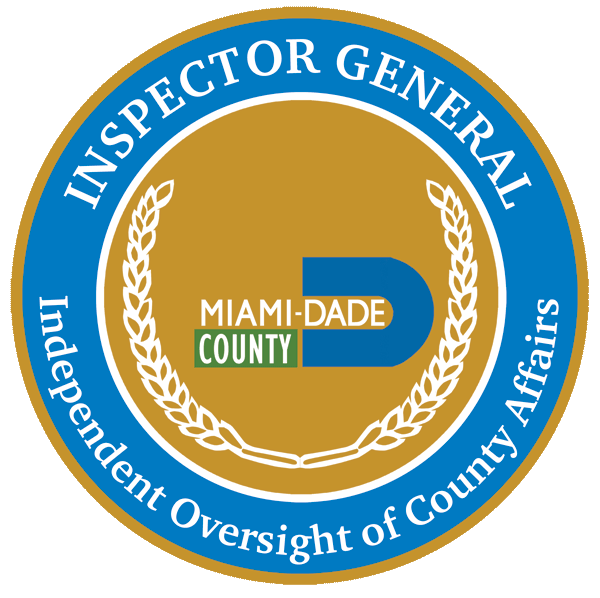|

Frequently Asked Questions
(FAQ's)
• What is the function of the OIG?
• How was the OIG formed?
• What is the jurisdiction of the OIG?
• What are the powers available to the OIG?
• Is the Office of the Inspector General a law enforcement
agency?
• Does the OIG have subpoena power?
• What mandatory obligations are placed upon
the Inspector General?
• How do I report acts of fraud, waste, abuse, mismanagement,
and/or corruption to the OIG?
• How do I file a complaint without losing my job
as a County employee?
• When
does the OIG initiate an investigation?
• Are
OIG investigations confidential?
• When
are reports of investigations made available to the public?
• When should I contact the OIG?
• What
happens if the OIG does not have jurisdiction over a matter?
What is the Function of the OIG?
The Office has the authority to make investigations of County affairs
and the power to review past, present and proposed County and Public
Health Trust programs, accounts, records, contracts, and transactions.
In order to carry out this function, the Office has the power to
subpoena witnesses and require the production of documents. Additionally,
the Inspector General may report and/or recommend to the Board of
County Commissioners whether a particular project or contract is
or was necessary, and if so, whether the method used is or was financially
and operationally efficient. Furthermore, the Inspector General
is authorized to conduct random audits, inspections, and reviews
on any County contract. Further, the Office is authorized to conduct
reviews, audits, inspections, investigations or analysis relating
to Departments, Offices, Boards, Activities, Programs and Agencies
of the County and the Public Health Trust.
How was the OIG Formed?
The Office of the Inspector General was created
by County ordinance and it empowered the OIG to investigate and
review allegations of waste, fraud, abuse and mismanagement. The
Miami-Dade County Board of County Commissioners determined that
the oversight of such a large and diverse government required the
organization and administration of the OIG to be independent and
autonomous, to assure that no interference or influence external
to the Office adversely affects the independence and objectivity
of the Inspector General. Under the amendment to the ordinance approved
by the Board of County Commissioners in March 2005, the Inspector
General serves a four-year term and future Inspectors General will
be selected by a committee comprised of the State Attorney, Public
Defender, Ethics Commission Chairperson, President of the Police
Chiefs Association and the Regional Director for the Florida Department
of Law Enforcement.
What
is the Jurisdiction of the OIG?
The Miami-Dade County OIG’s jurisdiction encompasses all county
departments, agencies, instrumentalities, and the programs thereunder.
This jurisdiction extends to all county employees, public officials,
and elected officials. The OIG also has jurisdiction over vendors
and contractors doing business with the County. In essence, the
OIG is the watchdog over the County’s money.
What
are the Powers Available to the OIG?
According to the OIG’s enabling legislation, the Office shall
have the power to require reports from the Mayor, County Commissioners,
Manager, county agencies, instrumentalities, and county officers
and employees and the Public Health Trust and its officers and employees
regarding any matter within the jurisdiction of the Inspector General.
Conversely,
the OIG may report to these same individuals its findings and recommendations
arising from an investigation, audit, or review. Unless otherwise
exempt from public disclosure, these findings and recommendations
are generally released in a public report.
Is
the Office of the Inspector General a Law Enforcement Agency?
No. The OIG is not a law enforcement agency. As such, our agents
do not have the authority to arrest individuals. The OIG, however,
is a criminal justice agency as determined by the Federal Bureau of Investigation (FBI). The OIG works in conjunction with law
enforcement agencies, the Miami-Dade State Attorney’s Office,
and the United States Attorney’s Office with respect to pursuing
criminal investigations.
Does
the OIG Have Subpoena Power?
Yes, although, most often, the OIG is able to acquire the same information
and/or obtain the same documentation using mechanisms already available
to us through our enabling ordinance, contract language, and other
legally binding agreements. In rare cases when a subpoena is necessary,
the OIG first notifies both the local United States Attorney’s
Office and the Miami-Dade State Attorney’s Office to insure
that the issuance of our subpoena will not interfere with an on-going
criminal investigation. OIG subpoenas are enforceable through Miami-Dade
circuit courts.
What
Mandatory Obligations Are Placed Upon the Inspector General?
Where the Inspector General detects criminal misconduct, the IG
shall notify the appropriate law enforcement agencies. When the
Inspector General detects a violation of a matter falling within
the jurisdiction of the Ethics Commission, he or she may file a
complaint with the Ethics Commission or refer the matter to the
Commission’s Advocate.
How
Do I Report Acts of Fraud, Waste, Mismanagement, Abuse, and/or Corruption
to the OIG?
You may report this information to us in one of four ways. You may
report your concerns to us by mail or fax in a written complaint.
You can stop by our office and meet with an OIG Special Agent and
provide the information directly to us. You may call our hotline
at (305) 579-2593 or access our secure email via this website to
provide us with the information. In any event, you may remain anonymous;
however, you are encouraged to identify yourself so that we may
follow up on your call or email and obtain additional information
that would help us in an our investigation.
If you give
us your name, your identity will be protected to the maximum extent
of the law. In addition, there are certain provisions under Florida
law and the Code of Miami-Dade County that protect employees and
independent contractors, engaged in business with the County, and
who have entered into a contract with the County, from retaliation
under certain circumstances. If you believe that making a report
to the OIG will place you at risk of retaliation, you should inform
the OIG of this fact.
How
Do I File a Complaint Without Losing My Job as a County Employee?
Under certain circumstances, the OIG may be able to provide you
with confidentiality. In addition, there are provisions under Florida
law and the Code of Miami-Dade County that protect employees from
retaliation under certain circumstances.
When
Does the OIG Initiate an Investigation?
Investigations are only initiated upon the receipt of credible information
alleging an act of fraud, waste, financial mismanagement or corruption
within the OIG's jurisdiction. Only the Inspector General can authorize
the initiation of an investigation.
Are
OIG Investigations Confidential?
Ongoing audits and investigations are exempt from public disclosure.
However, once an audit or investigation is finalized it becomes
a public record, pursuant to Florida’s public records laws.
When
are Reports of Investigations Made Available to the Public?
Once the OIG closes an investigation, the investigative
report or audit is usually made available to the public by filing
it with the Clerk of the Board and through its publication on the
OIG’s website.
When Should I contact the OIG?
You should contact the OIG whenever you have reason to suspect fraud, waste, misconduct, or any other concerns within the County's government. Our telephone hotline is (305) 579-2593.
What Happens If the OIG Does Not Have Jurisdiction
Over a Matter?
You will be notified of this fact, and whenever possible, we will
refer you to the appropriate agency or organization that can provide
assistance.
|






